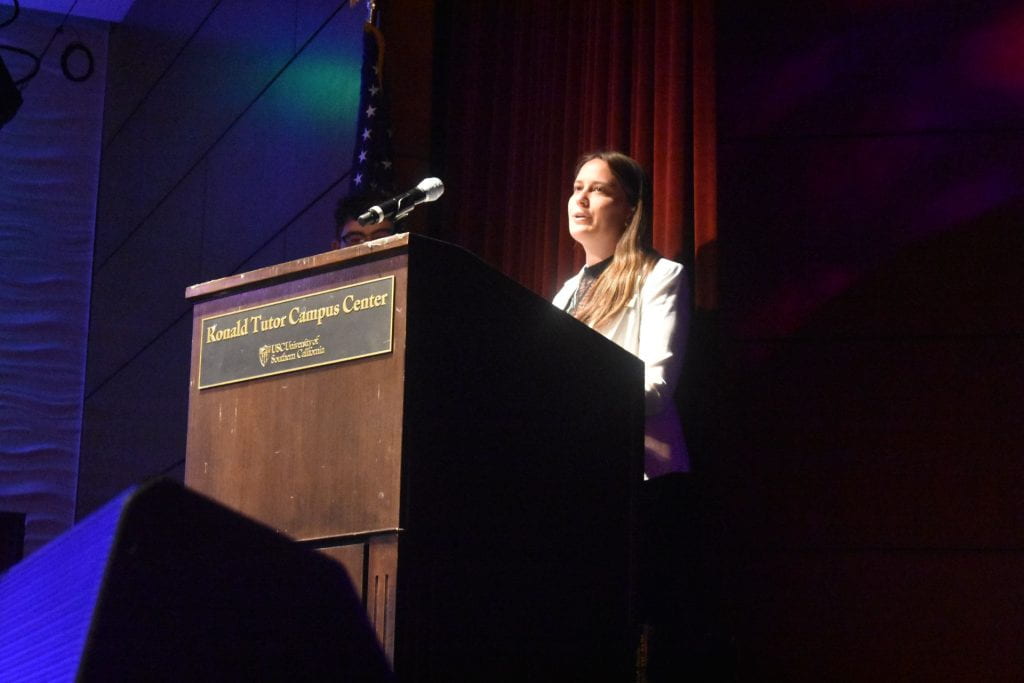Megan van der Toorn

by Elizabeth Bluth
Megan van der Toorn, the Director of SEIP Intercultural Services (including gender equity programs) and the LGBTQ+ Student Center, has wanted to be a resource for students since her undergraduate days at a small private liberal arts university in South Carolina. van der Toorn was an out and queer student and while serving as president of the only queer and feminist student organization, she noticed the lack of an LGBTQ+ Center or peer community on her campus.
van der Toorn’s student leadership experiences soon brought her in contact with student-focused professionals and it was through them she discovered a possible career in student affairs, where she could help build spaces of support for female, queer, and gender-expansive students, and help them find a sense of community.
“I don’t know that I would have pursued a field like Student Affairs without the expanded access that Title IX grants for women, and queer and trans folks,” said van der Toorn, who uses she/they pronouns. “I love my work. I love experiencing queer and trans joy with students.”
van der Toorn noted that so many of the narratives around queer and trans experiences these days are rooted in hardships and trauma. While those definitely exist, their focus is on building communities for folks to support each other. “I get to be a part of the ways in which the many intersections of identities within these communities lift each other up, celebrate queer excellence, and create joy.”
For van der Toorn, Title IX is a driving force behind much of her work at USC and the previous institutions at which she’s served. As the supervisor for three different LGBTQ+ resource centers on three different campuses van der Toorn has been able to create spaces where students want to be. It’s “a home away from home,” and her role allows her to be the best advocate for the queer student experience. “I can take on some of the emotional labor from the students’ shoulders and fight for them so that they can reap the benefits and rewards of a positive campus experience without as many stressors,” van der Toorn said.
Since July 2020, when van der Toorn first started her job at USC, she has worked to create student-driven culture and programming that highlights different identities and lived experiences. “Student activism has played a huge role on this campus and for the LGBTQ+ Student Center since its founding in 2005.” van der Toorn said she hopes to continue to expand the Center’s reach so as many students as possible feel seen and valued in the intersections of their identities.
This philosophy supported the Renaissance Ball this spring, planned by the LGBTQ+ Student Center’s graduate assistant, Hassan B. Marong. The evening brought together Black and queer students for an uplifting night of ballroom culture celebrations and pageantry. Moments like the Renaissance Ball affirm gender-expansive, queer, and marginalized student identities and build authentic communities across campus, said van der Toorn. “It’s so transformative and moving.”

As co-chair of the Gender Identity and Sexual Orientation Systemic Barriers Task Force (GISOSBTF), van der Toorn and her colleagues in the Office for Equity, Equal Opportunity, and Title IX (EEO-TIX) are looking at what structural issues across USC are getting in the way of students, faculty, and staff thriving and experiencing the institution positively. “When you think about gender more expansively, you consider the social constructions of gender, how you internalize the different gender roles and norms and how we treat each based on those norms.” Whether it’s through scholarship dollars, research funding, or something as simple as a gender-neutral bathroom map for campus (something van der Toorn has been working on with the (GISOSBTF), Title IX can drastically change the campus experience for students of a marginalized gender. “The work I do professionally supporting students’ rights, advocacy, safety, community, and ability to thrive — and even the way I think about student life — is rooted in equitable experiences regardless of protected class.”
One of the many ways van der Toorn has promoted equitable experiences at USC is through her work to institutionalize the celebration of LGBTQ+ History Month. While Pride is an internationally recognized month of queer celebration, it occurs in June when most students are not on campus. However, October is LGBTQ+ History Month and having the university recognize and celebrate queer and trans history during this month (which also includes National Coming Out Day, International Pronouns Day, and Asexual and Intersex Awareness Weeks), provides a more opportune time for students to come together in their communities and to feel seen and affirmed by the university.
This past October, van der Toorn and the LGBTQ+ Student Center partnered with QuASA, the Queer & Ally Student Assembly, for Pride Fest, an event that allowed drag queen performers, local community organizations, and over 500 students to connect all in one place. “This is something the campus doesn’t experience all that often. Thousands of members of our student body identify as queer and trans and to have them all together in celebration is really, really cool.”